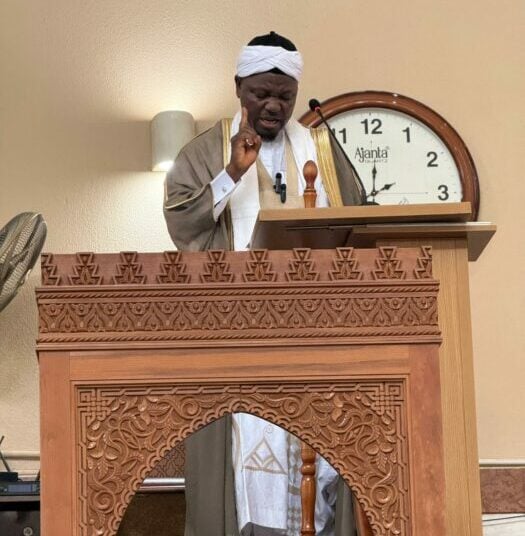In the precincts of Nigeria’s National Mosque, Abuja, a sermon spoke not merely to worshippers but to a city hungry for shape, common understanding, and shared purpose. Delivered by the esteemed Imam Dr Abdulkadir Al-Salman — the Ubandoma of Ilorin Emirate, — the address carved a path through questions that often scatter congregations into faction and fatigue. His message was simple in cadence, emphatic in intention: when Friday matters are explained with clarity, unity follows; reverence deepens; faith is put to work in daily life.
The sermon opened in the traditional register of gratitude. Allah, the Most Gracious, the Most Merciful, was thanked for granting humanity the gift of prayer — a mercy extended, a bond forged between worshipper and Creator, a discipline designed to strengthen faith and widen compassion. Friday, though venerable, was not presented as an island unto itself. It belongs to a broader tapestry—the weekly rhythm of prayer, the discipline of time, and the etiquette of communal gathering — each thread woven into the Sunnah, the living tradition of the Prophet Muhammad, Sallallaahu alayhi wa sallam. The preacher’s voice carried not as a bell toll of ritualism but as a careful reminder that sacred acts gain their weight when they intersect with everyday conduct.
A thread that ran through the discourse was the imperative not to permit difference to corrode communal harmony. The Imam invoked a familiar exhortation — the Prophet’s exhortation to his companions at the hour of death: “The prayer, the prayer.” The point, he explained, is not the ritual flourish but fidelity, humility, and intention. The sermon’s intimate references to the Prophet’s life anchored the community in a shared lineage, a living tradition that calls for steadfast practice as well as generosity of spirit. It is not enough to perform the rite; one must perform it with a heart aligned to the Sunnah, with a mind stretched toward communal responsibility rather than personal pride.
The central question, preoccupying mosques from Nation Mosque’s gates to distant towns, concerns timing: when precisely should the Friday prayer begin? Across many houses of worship, scholars and congregants alike have debated the moment to commence. Some mosques observe the noon prayer within a single window; others segment the period into two, three, or even four windows. A few link the gathering to an early entry into the late afternoon. Such variations, the Imam suggested, need not fracture the community if approached with humility and reverence for the Sunnah. The real concern, he argued, is not the exact minute but whether the listener has entered prayer with purity of intention.
To illuminate the matter, the Imam offered a careful, almost numerical meditation on time. Islamic jurisprudence recognises different windows for prayer: an obligatory window, an optional one, and intervals for performance and, when necessary, for making up. The “best” window for offering the prayer, he noted, is the optional one — a window that may be divided into distinct segments. He illustrated three partitions within the optional period, a practical guide to how timing might be navigated without defeating the spirit of unity. He reminded his audience that where mosques diverge—some starting at noon, others delaying into the mid-afternoon—the essence remains intact so long as intention is sincere and the Sunnah is respected. The moral, he insisted, is not precision for its own sake but fidelity to the traditions within a frame of neighbourliness and mutual respect.
A second matter concerned the ritual of Tahiyyatul Masjid (greeting the mosque) — praying Nafilah — during the Khutbah. Within the Maliki school, there is guidance about when voluntary prayers, including the Tahiyyatul Masjid, should not be performed: specifically at moments when the imam has mounted the pulpit, begun the sermon, or delivered the bulk of it. Yet the Imam urged a generous reading of tradition. He asked listeners to consider crowded congregations, diverse scholarly opinions, and the simple humanity of a worshipper who, in a moment of devotion, performs Tahiyyatul Masjid. The point, he suggested, was not to police every gesture but to hold to one’s own understanding while honouring a sincere difference of interpretation. The aim was not doctrinal rigidity but a humane, inclusive practice that binds rather than fractures.
A third matter — the interval between the two sermons — concerned supplication: whether to lift the hands and when. The Prophet’s guidance about the day’s hour of acceptance — the time during which supplications are most likely to be granted — was cited as a reminder that Friday is not a solitary moment but a day to be lived in its totality: acts of charity, remembrance, and prayer coalescing into a sustained spiritual discipline. The counsel was simple: embrace the day in all its fullness, rather than fixate on one fleeting instant of grace. Allah alone, the preacher reminded, knows the hour of acceptance. The faithful should, therefore, seize the day in its entirety, letting Sunnah guide every action and supplication.
The sermon did not neglect a fourth matter: the practice of salaam at four distinct moments during the khutbah, and whether to honour the mosque with salutation in the moments when the imam is on the pulpit or delivering the sermon. The Imam’s gloss on the Maliki view showed a willingness to nuance, a readiness to acknowledge living tradition amid crowded realities. This was not a call for chaos, but a reminder that piety exists within the imperfect, human experience of worship — where intention and compassion can outweigh exactitude when measured against the Sunnah’s broader arch.
Then came a call for solidarity. If disagreement flickers like flame in kindling, let humility be the wind that stirs it into constructive conversation. If debate took root, temper it with restraint and a shared fidelity to the Prophet’s Sunnah. The aspiration, he insisted, was not to enforce uniformity for its own sake but to cultivate a unity of purpose — an ethical framework within which communities can thrive. The flock should be guided toward a shared life in which centuries of scholarship are not relics but living resources guiding present-day practice. To walk this path, he argued, is to strengthen a public sphere in which differences are treated as opportunities for dialogue rather than opportunities for division.
As the sermon neared its close, the faithful were reminded that prayer is more than rote ritual. It is a daily reckoning, a bridge to the divine, and the hinge upon which a community turns toward Allah together. It is the first obligation and the last counsel of guidance. The Imam’s closing exhortation was both practical and spiritual: safeguard the sanctity of prayer, cultivate disciplined humility, and carry the Sunnah forward in every hour of Friday. The call was not for awe alone but for a shared discipline, a daily practice that translates doctrinal nuance into living virtue.
Beyond the sermon’s rhetoric lies a more enduring invitation: translate complexity into clarity; welcome difference with charity; align daily life with a broader arc of communal responsibility. The city’s readers—whether haggling over produce at the market or listening in a quiet room—are urged to take from these lines a counsel not of polemical contention but of shared practice: that the Friday prayer remains the heart’s hinge, the moment in which a community turns toward Allah together.





